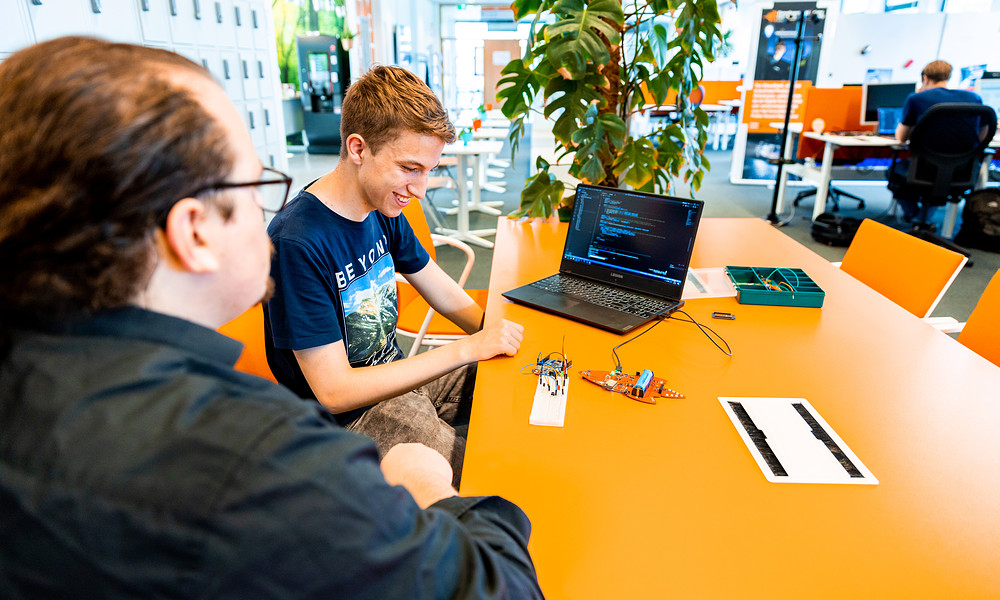AI and Your Future Profession
- Minor
AI and Your Future Profession

Do you want to prepare for the future in which you will have to deal with AI and data in your profession? Do you want to be able to use the power of data to become a better professional? Will your future job change drastically through the use of data and algorithms? And how can you ensure that these algorithms are applied fairly and transparently?
Artificial intelligence (AI) and data are now part of everyday life. From smart assistants that write your emails, to apps that generate music, summarize lectures, or suggest the best route to work — AI is all around us. Even decisions about what you read, buy, or apply for are increasingly influenced by algorithms.
AI is transforming every profession — from healthcare and education to business, law, and the creative industries. Do you want to prepare for a future in which AI and data are an essential part of your work? How can you use intelligent systems and data-driven insights to work more efficiently, make better decisions, or even automate parts of your job? In this minor, we don’t just explore what AI can do — we also focus on how to use it in a responsible, transparent, and trustworthy way, ensuring that technology truly serves people and society.
This minor welcomes students from every background who want to understand how AI and data will shape their profession. You’ll gain a broad and practical understanding of artificial intelligence: from exploring how algorithms and neural networks work, to reflecting on the ethical and legal challenges of responsible AI. Data plays a central role — you’ll learn how to collect, analyse, and use it as the foundation for AI systems. In multidisciplinary teams, you’ll also collaborate on a group project for a real company or organization, where you apply what you’ve learned to a concrete professional question.
For example, Albert Heijn recently started experimenting with dynamic pricing, where an algorithm calculates how much a product should be discounted based on weather conditions, location, and other variables. If it suddenly starts raining, the store may decide to discount the barbecue meat — and the new price instantly appears on an electronic sign. Recent AI projects by Hanze students show how diverse these technologies can be:
This minor is designed to fit your background, interests, and learning goals. We believe that everyone can learn to work with AI — whether you study Nursing, HRM, Law, Communication, or ICT.
During the minor, you’ll set your own learning goals related to AI and data, based on what is most relevant for your future profession. Throughout the semester, you’ll keep a portfolio in which you collect your work, reflections, and progress. Teachers act as coaches, helping you shape your learning path and achieve your goals. You’ll attend classes on the foundations of AI, but a large part of your learning takes place through your own project or dataset — something that matters in your field.
We offer both technical and non-technical learning paths, but the exact route is up to you:
Your progress is more important than your starting level or final product. You’ll be assessed based on your development, as demonstrated in your portfolio and a final interview in which you reflect on what you’ve learned.
The minor consists of the following courses:
AI and your profession (5EC)
As a student, you bring in questions and experiences from your own field. What are the most relevant AI and Data Science developments in your field? What Machine Learning models are used in your future profession? Where did these techniques come from and what are the latest developments? What will the impact of the recent AI boom in Large Language Models be on your future profession?
In this course, you will explore a wide range of AI applications and reflect on how AI concepts relate to your future profession. Through guest lectures by industry experts, we will examine the use of AI and data science in fields such as healthcare, business, and government. Together, we will discuss common challenges, ethical and legal considerations, and the societal and professional impacts of recent advancements in AI.
From data to value (5EC)
Data is the driving force behind today's technological advancements, and machine learning is the engine that transforms data into actionable insights. This course is designed to provide you with a solid foundation in data science and machine learning.
In this course, you will learn the basics of data processing, visualization, and analysis with the purpose of machine learning. Moreover, tasks such as regression and classification and different machine learning models are discussed. You will work hands-on with tools and models that are widely used in the field, and learn skills you can apply to your own profession. The course is extended in From Data to Value 2.
Project part 1 (5EC)
In this project, you work in multidisciplinary teams on a real-world AI challenge for an external organization. You apply the techniques learned in class while maintaining a professional relationship with your client. Students can apply for a specific project, which usually focuses on generative AI applications, data analysis, object detection, or predictive modelling. Project Part 1 involves getting to know the client, establishing a workflow, conducting exploratory and business analyses, and completing other preparatory tasks that lay the foundation for the technical work in Part 2.
From Data to Value 2 (5EC)
In this course, which is an extension of From Data to Value 1, you will learn about various algorithms used in machine learning. We will dive into the technical side of recent AI trends, as well as how they work with Neural Networks and Deep Learning. Moreover, we will consider fundamental tasks and applications for AI, such as Speech Technology, Anomaly Detection, Computer Vision, and Recommender Systems.
Project part 2 (10EC)
Project Part 2 is an immediate continuation of Part 1. In this phase, you and your team work on the technical implementation of your assignment. Depending on your project, this may involve integrating a Large Language Model, training a machine learning algorithm, or developing another AI-based solution. This second project is worth 10 EC, reflecting your increased AI knowledge, technical skills, and ability to manage a larger and more complex workload.
Literature will be provided digitally.
If there are no English-speaking participants, the course will be in Dutch.
You can find information about the application procedures by checking the ‘Knowledge base’ in Myhanze.
You can find information about the application procedures on the website Kies Op Maat.
You can find information about the application procedures here.

Docent-onderzoeker AI & Data Science
How satisfied are you with the information on this page?